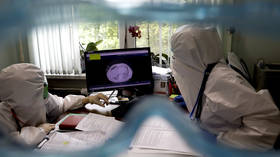Weird science: Covid-19 does NOT cause heart damage, as blockbuster study had basic calculation errors

A widely circulated scientific study reported that Covid-19 causes long-term heart problems. Its authors have been forced to issue major corrections after they wildly miscalculated the risk, but the damage has already been done.
The scientific establishment wields a lot of power these days. The emergence of the novel coronavirus has elevated many career scientists and academics to positions of great influence, acting as advisors and commissars to governments on all things Covid-related. Which, it turns out, is everything. That is why it is so important that they conduct rational, unbiased research, and analyse all findings with great scepticism, taking nothing for granted.
Weird science
Alas, that was never going to happen. Unless you follow the right Twitter accounts (such as Alex Berenson who has been indefatigable in his criticism of shoddy Covid-19 ‘science’), you won’t read about this anywhere else. But what should be a pretty big scandal resulting in a major inquiry into publishing practices is currently underway in the field of cardiology.
Just over a month ago, a paper from Germany entitled, ‘Outcomes of Cardiovascular Magnetic Resonance Imaging in Patients Recently Recovered From Coronavirus Disease 2019 (COVID-19)’, was published in the journal JAMA Cardiology. It was based on 100 people recently recovered from Covid-19, who underwent MRI scans to find factors associated with damage to their hearts.
The article quickly became a smash hit, going viral, inasmuch as academic research can. It racked up hundreds of thousands of interactions on its Altmetric score, a tool that tracks how much a piece of research is being clicked, shared and talked about online. No doubt, this was owing to the paper’s bombshell conclusions. If Covid-19 was strongly linked to long-lasting heart disease in a significant proportion of those who survive it, that would be a hugely important thing to know.
A comedy of errors
The only problem with the conclusion of the paper is that almost every piece of data given to support it was wrong. As more and more media breathlessly reported that Covid-19 will eventually kill everyone with heart attacks, the mathematically minded on Twitter – including Darrel Francis, a Professor of Cardiology at the National Heart and Lung Institute – began to point out obvious miscalculations and mismatches in the results of the study.
The authors appeared to confuse medians for means, and data points present in the graphs were absent elsewhere. In essence, the paper was riddled with remedial mistakes that the first few hundreds of thousands of people who read it (or scan the last few sentences) failed to notice.
Also on rt.com Covid-19’s an adult disease: Children at ‘tiny’ risk of acute coronavirus, UK academics claimBut Professor Francis is still not happy with the reissued article, launching another scathing attack on his Twitter account. He has more than the layman’s knowledge of statistics, but he lays out in no uncertain terms that the authors are still, even after their extraordinary climb down, fudging the numbers. He is adamant that the corrected figures show that while people who have recovered from Covid-19 do show markers of heart disease in their MRI scans, so do people of similar health profiles who have not had the virus. That is, Covid-19 had absolutely nothing to do with the heart damage seen in the people in the study.
The authors of the study, meanwhile, have not taken kindly to the egg on their faces. They have lashed out at Twitter’s dismantling of their less-accredited math skills, (not sure people outside UK will know what these are) griping that a letter to the editor “would indeed be more appropriate.” It only took them a month to correct their substandard article, but by that point the damage was done. Just the other day I actually had someone casually inform me that “Covid causes heart damage.” Clearly the study’s reach has been wide. Whether its debunking will have as wide a reach remains to be seen.
Think your friends would be interested? Share this story!
The statements, views and opinions expressed in this column are solely those of the author and do not necessarily represent those of RT.













